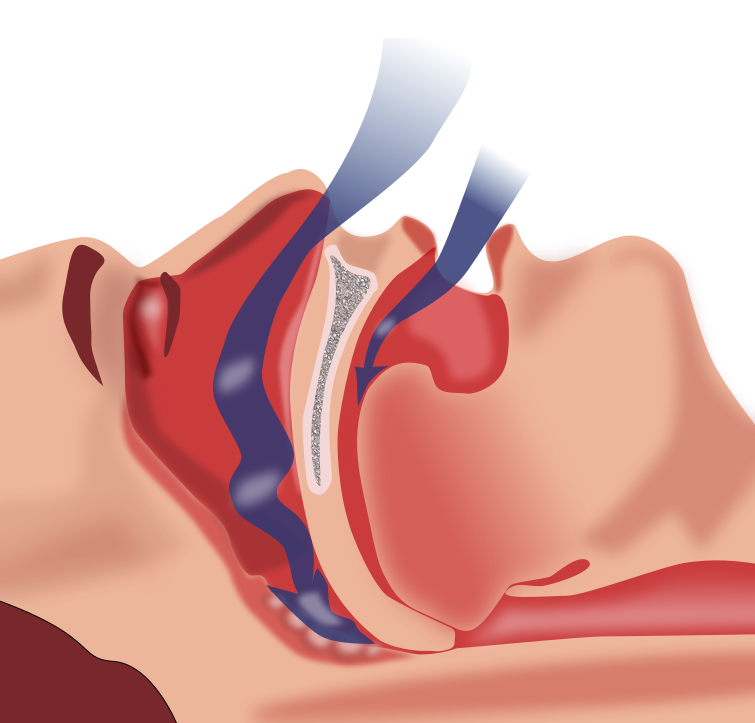A friend of mine died a couple of years back, of heart failure. Heart problems are very common, anid have many possible causes. He also had a condition called obstructive sleep apnoea, which has long been linked with heart problems. But nobody's ever quite known why.
Obstructive sleep apnoea, or OSA, is surprisingly common, affecting almost a quarter of men and almost one in ten women. The muscles and soft tissues of the throat relax and collapse, blocking the airway wholly or partially and therefore interrupting breathing.
Now, for sleep to serve its purpose, we have to spend a certain amount of time in a state of deep sleep. Each time you have an episode of OSA, you enter lighter sleep or even wake very briefly in order to restore normal breathing. This cycle can repeat many times a night, up to once a minute in extreme cases.
These repeated sleep interruptions lead to the person with OSA feeling very tired during the day. They have no memory of the periods of breathlessness, so are often unaware that they are not sleeping properly.
Among the complications of OSA are heart problems: increased heart rate and blood pressure, and heart attack. The mechanism by which this happens has never been understood. Now a group of researchers at George Washington University in Washington DC seem to have uncovered it.
Our resting heart rate is maintained at an appropriately low level by a group of parasympathetic neurons in the brainstem. By mimicking OSA in rats, the researchers discovered that during OSA episodes the activity of these neurons is inhibited, leading to an increase in heart rate and the possibility of irregular heartbeat and high blood pressure.
It's too late for my friend David. But now researchers know where to focus their future work. They must try to restore the normal cardio-protective function of these neurons in people with OSA, to reduce the risk of cardiac problems, so that OSA no longer carries the risk of death.
Friday, 16 May 2014
Thursday, 1 May 2014
Writing semi-autobiographical fiction about disability #BADD14
This is my post for Blogging Against Disablism Day 2014.
Well. I've finally taken the leap of faith, and started writing the novel that's been tunneling out of my subconscious for the last couple of years. And they do say write about what you know. So I'm writing in the first person about a woman who develops MS.
But is writing semi-autobiographical fiction really worthwhile? And can a novel about disability be interesting to a general audience?
If my story was purely autobiographical, it would be a thinly disguised version of my own life story, with names and locations disguised. Firstly, this would certainly be excruciatingly boring for the reader. Secondly, parts of it would probably be actionable!
So what I'm doing instead is using my personal knowledge of my condition - multiple sclerosis - and how it affects me, and inventing a background, relationships, and story for my protagonist. I have access to the emotions I felt when I developed and was diagnosed with MS, and anecdotes from friends with MS of how their family, friends, and work colleagues reacted.
A novel is not just about the one central plotline, or it would be very short indeed. I can use my experience, both of disability and everyday life, as inspiration for plot points and to help me understand my characters' emotions. So, for instance, a real-life neighbour who takes her ferret for a walk every day in an animal carrier will be making an appearance, along with her pet.
Real life isn't connected. Random things happen at random times. Wild coincidences take us by surprise, that we wouldn't believe for a second in fiction. In a novel, however much it draws on your own life, you have to order and arrange your material to make some sort of coherent narrative .
In the end, as Tom Clancy said:
And who knows? Perhaps if I can make it funny and accessible (and anyone wants to read it anyway!) it'll get over a bit of information about disability in general and MS in particular along the way. Which would be no bad thing, right? The more people know, the less stigma and disablism we'll hopefully all encounter.
So. If there's anything you think from your own experience I should try to include, please let me know in the comments. Otherwise, I'll keep you updated as much as I can. And rest assured, once it's finished I'll pimp it to death!
Well. I've finally taken the leap of faith, and started writing the novel that's been tunneling out of my subconscious for the last couple of years. And they do say write about what you know. So I'm writing in the first person about a woman who develops MS.
But is writing semi-autobiographical fiction really worthwhile? And can a novel about disability be interesting to a general audience?
If my story was purely autobiographical, it would be a thinly disguised version of my own life story, with names and locations disguised. Firstly, this would certainly be excruciatingly boring for the reader. Secondly, parts of it would probably be actionable!
So what I'm doing instead is using my personal knowledge of my condition - multiple sclerosis - and how it affects me, and inventing a background, relationships, and story for my protagonist. I have access to the emotions I felt when I developed and was diagnosed with MS, and anecdotes from friends with MS of how their family, friends, and work colleagues reacted.
A novel is not just about the one central plotline, or it would be very short indeed. I can use my experience, both of disability and everyday life, as inspiration for plot points and to help me understand my characters' emotions. So, for instance, a real-life neighbour who takes her ferret for a walk every day in an animal carrier will be making an appearance, along with her pet.
Real life isn't connected. Random things happen at random times. Wild coincidences take us by surprise, that we wouldn't believe for a second in fiction. In a novel, however much it draws on your own life, you have to order and arrange your material to make some sort of coherent narrative .
In the end, as Tom Clancy said:
The difference between fiction and reality is that fiction has to make sense.Do novels about disability have to be serious? Not in the least. You can see humour in any situation. My heroine is a strong, funny woman. Yes, being diagnosed with MS is a major, serious life event. But looking back on it, the process is full of humorous moments. If I can see that, so can she. Real life isn't always funny at the time. But a book can be.
And who knows? Perhaps if I can make it funny and accessible (and anyone wants to read it anyway!) it'll get over a bit of information about disability in general and MS in particular along the way. Which would be no bad thing, right? The more people know, the less stigma and disablism we'll hopefully all encounter.
So. If there's anything you think from your own experience I should try to include, please let me know in the comments. Otherwise, I'll keep you updated as much as I can. And rest assured, once it's finished I'll pimp it to death!
Subscribe to:
Comments (Atom)




